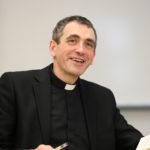The purpose of this course is to ponder, with the help of the theological tradition, the sense in which the Triune God can be understood as a mystery of communion of persons and how this account of the Deus Trinitas grounds the way man’s being images God. John Paul II wrote that “being a person in the image and likeness of God thus also involves existing in a relationship, in relation to the other ‘I.’ This is a prelude to the definitive self-revelation of the Triune God: a living unity in the communion of the Father, Son and Holy Spirit” (Mulieris dignitatem, 7). At the same time, he also said that “the primordial model of the family is to be sought in God Himself, in the trinitarian mystery of his life” (Letter to Families, 6). The course also seeks to elucidate the relation between the Paschal Mystery and the Trinity. The trinitarian reflection carried out in the course is therefore at the service of laying out the theological basis for the anthropology and metaphysics of love as well as the sacramentality of marriage and soteriology elaborated by St. John Paul II.
Selected Texts
Augustine, The Trinity.
Joseph Ratzinger, Introduction to Christianity.
Hans Urs von Balthasar, Theo-Logic, Vol. II: Truth of God.
Antonio López, Gift and the Unity of Being.
Faculty

Antonio López, F.S.C.B.
Vice President
Provost
Professor of Systematic Theology
Rev. López teaches and writes in the areas of trinitarian theology, metaphysics, theological anthropology, and marriage. He serves as editor of Humanum Academic Press and of the English Critical Edition of the Works of Karol Wojtyła and John Paul II, a continuing series from CUA Press.
Learn More